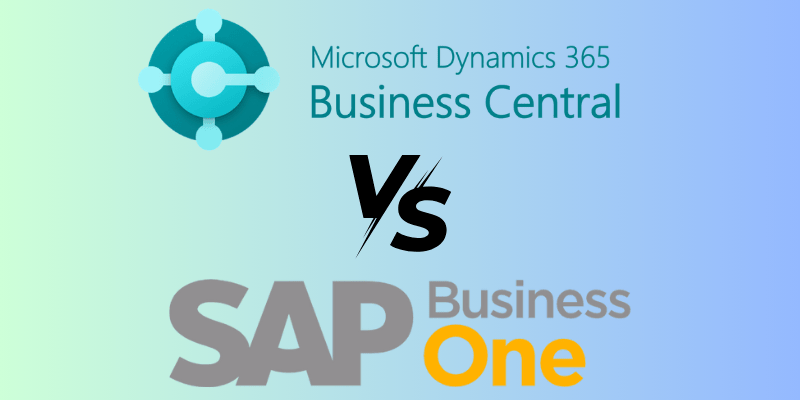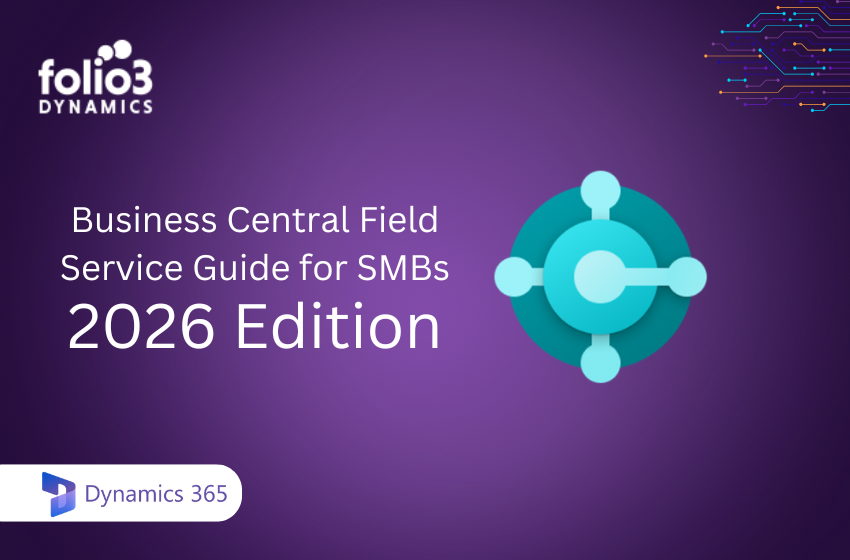At some point during your business life, you must have come to a crossroads where you have to make the tough decision of choosing the right ERP solution for your business.
With compelling options like Dynamics 365 Business Central vs. SAP Business One, you might feel overwhelmed when deciding which one is better suited for your operations. Both systems warrant better workflows and enhanced efficiency, but which one is the right fit for you?
Let us compare and contrast their features, usability, and pricing to help you make this tricky choice.
Dynamics 365 Business Central vs. SAP B1: Comparison Table

Let’s take a quick look at the key differences between these two ERP platforms. This comparison table will help you see their strengths and weaknesses.
Feature | Dynamics 365 Business Central | SAP Business One |
Target Audience | Small to Medium Sized businesses (SMBs) | Small to Medium Sized businesses (SMBs) |
Deployment Options | Cloud, On-premise, Hybrid | On-Premise, Limited Cloud Support |
User Interface | Modern and user-Friendly | Traditional and more complex |
Integrations | Extensive, especially with Microsoft tools | Limited third-party integrations |
Scalability | Highly scalable with regular updates | Less scalable for growing businesses |
Customization | Flexible and user-friendly | Requires technical expertise |
Pricing | Subscription-based, cost-effective | Licensing fees, higher cost |
Comparison of Dynamics 365 Business Central and SAP Business One
Let us begin our Dynamics 365 vs. Sap Business One comparison to help you determine which software will help you achieve your business goals smoothly.
What is Dynamics 365 Business Central?
Dynamics 365 Business Central is a modern ERP solution designed for SMBs. It is embedded in complete tools that help you manage finances, operations, supply chain, and manufacturing processes. It is developed to integrate easily with the Microsoft ecosystem.
It is a go-to choice for businesses that have previously used tools like Outlook, Teams, and Office 365. Its ability to support cloud and hybrid deployments provides flexibility for businesses of all scales and sizes.
What is SAP Business One?
SAP Business One is another renowned ERP solution for small to medium-sized businesses. It comes with tools for managing core business functions such as finance, inventory, and customer relationships.
Although it provides all prime ERP capabilities, it basically focuses on on-premise deployment. This can be a significant drawback for companies that want to utilize cloud technology for better accessibility and cost savings.
Features of Business Central and SAP Business One
Now that we know the basics of Dynamics 365 and SAP One, let’s explore their features.
Integrations
Dynamics 365 Business Central features numerous integrations, especially within the Microsoft environment. It connects easily with Power BI for analytics, Teams for collaboration, and Excel for data management, creating a cohesive workflow with all your business tools.
SAP Business One offers fewer integration options. While it can integrate with certain third-party tools, the process often requires additional configuration and technical expertise.
Productivity
Dynamics 365 kicks off business productivity by automating daily tasks and providing real-time data about your business performance. Its AI-driven tools enable businesses to predict future trends and make data-driven decisions.
SAP Business One supports standard ERP functionalities and a traditional interface. However, it lacks advanced automation that can slow down workflows for teams that are used to modern tools.
Usability
When it comes to comparing usability, Dynamics 365 outshines owing to its intuitive design. Dynamics 365 gives a familiar feel, especially if your team is already using other Microsoft products. SAP Business One has a more traditional interface that needs staff training in order to gain proficiency.
Pricing and Licensing
Pricing and licensing are always concerns for SMBs. Let’s have a quick look at them for a swift comparison of Microsoft 365 Business Central vs. SAP One.
Microsoft Dynamics 365 Business Central
Business Central has a subscription-based model. You can choose between Essentials or Premium plans, which creates a lot of cost flexibility. This pricing structure is suitable for businesses that want predictable and manageable monthly expenses without hefty investments.
SAP Business One
SAP Business One has a licensing model, which can be a deterring factor for many businesses. Although it provides the option for perpetual licenses, the initial costs and additional charges for implementation and maintenance make it less budget-friendly when compared with Dynamics 365.
Implementation Options
A successful implementation process for an ERP is a guarantee for its success.
Implementing Dynamics 365, Business Central is straightforward because of its modular structure and flexible deployment options. Based on your current IT setup and business needs, you can choose cloud, on-premise, or hybrid models.
SAP Business One’s implementation process usually requires more time and resources. Its heavy reliance on on-premise deployment can make it a less suitable option for businesses seeking quick and scalable solutions.
Customizations
Customizations play a great role in optimizing your business operations. They ensure that your ERP is in harmony with your business processes. Dynamics 365 Business Central stands out by offering user-friendly customization options. You can modify dashboards, reports, and workflows without requiring high-level technical skills.
While customizable, SAP Business One usually needs professional expertise to make major changes, which can boost the overall cost and complexity of the platform.
Depending on the Business
The type of your business is the main determining factor in deciding between these two platforms. If you are growing rapidly and need high scalability, Dynamics 365 Business Central is a better choice. Its cloud-first approach lets you add users, features, and capabilities as your needs change and expand.
On the other hand, SAP Business One is a better choice for businesses with low scalability requirements and those who prefer a traditional system. However, it must be kept in mind that it lacks the modern tools provided by Dynamics 365.
Deployment and Adoption
Adopting Dynamics 365, Business Central is a simple process due to its cloud deployment options. Teams can start using the system quickly without requiring extensive hardware.
SAP Business One needs a more significant initial investment in infrastructure for on-premise deployment, which can delay adoption and soar costs.
Functionality
A comparison between Dynamics 365 and SAP business functionalities shows that Dynamics 365 provides AI-driven insights, powerful financial tools, and advanced reporting features. SAP Business One provides solid ERP functionality but lacks the modern features that many businesses need now in the fast-paced environment.
Improvements and Scalability
Dynamics 365 Business Central outperforms when it comes to scalability. With its frequent updates and continuous improvement, businesses always have access to the latest features, allowing the system to grow with their needs.
SAP Business One is less scalable, with less frequent updates and customization that requires significant effort. For growing businesses, this can be a considerable hurdle.
Conclusion
When comparing Dynamics 365 Business Central vs. SAP Business One, the choice solely depends on your business goals and priorities. Dynamics 365 Business Central takes the lead due to its modern features, simple integrations, and highly scalable pricing model. It is a flexible and futuristic solution for businesses that want to prosper in today’s highly competitive market.
At Folio3, we’ve helped multiple businesses successfully implement Dynamics 365 Business Central. From initial setup to customization, we guarantee that your ERP solution matches your unique needs. If you are ready to take the next step, let us connect and collaborate to see how we can help!


